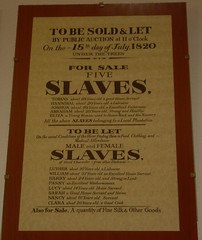
Sunday, 19 April 2009
Bags for life

The scariest product demo ever

Anyone seen that advert for Senokot constipation cure? It's essentially a demo ad, but it is an incredibly scary one that has me crossing every part of my body that I'll never get constipated. There’s a woman with a big handbag and it goes “imagine this bag is your stomach, over the day it’s getting full of food” and so on, and this woman’s carrying around this big handbag full of food and other crap representing her constipated stomach.
And then it goes on to advertise the magical cure they’re selling and that you’ll be free of constipation: seems straight forward so far. The thing is, to demonstrate how it works, the woman gets the bag, the bag that’s full to the brim with food, and tips it upside down into the bin!
Imagine that was your stomach! WHUMP! There ya go! All your fucking stomach contents BANG, straight out of your arse. You better be near a toilet when you take these tablets cause you’re gonna lose a fucking kidney! I couldn’t believe it. I’d rather be a big bag full of food than have the entire contents of my stomach leave my body in under a second. Fuck that!
Monday, 6 April 2009
Creativity today
Sunday, 1 March 2009
Unileverage
 Giant umbrella company, and all round enormous conglomerate Unilever is to start putting its logo in adverts for its products, which until now have lived completely separate lives. http://www.brandrepublic.com/News/884449/Unilever-debut-logo-consumer-ads-March/989BD06090ABCD5E84FC9234B1061C03/
Giant umbrella company, and all round enormous conglomerate Unilever is to start putting its logo in adverts for its products, which until now have lived completely separate lives. http://www.brandrepublic.com/News/884449/Unilever-debut-logo-consumer-ads-March/989BD06090ABCD5E84FC9234B1061C03/- Is a lover of Skittles more likely to buy Sheeba for his cat if he knows they're both owned by Masterfoods?
- Is a guy who always shaves with Gillette going to be more open to buying Ariel detergent if he knows they're both owned by Procter and Gamble?
- Got a laundry brand talking about environmental friendliness, but also own a battery company doing nothing to prevent millions of disposable batteries being sent to landfill each year?
- Own the leading ice cream brand AND the leading diet food brand?
- Do you have one brand telling women they're beautiful as they are and another telling them to slap more make-up on?
Monday, 23 February 2009
Loving the brands you work on
 Lately I've found myself becoming somewhat evangelical about brands that 6 months ago I didn't give a shit about. I find myself almost getting into fights to defend brands that a year ago I'd never heard of. I find myself buying extra products from a brand to help them make it through the credit crunch, when before I wouldn't have used their products if they were free.
Lately I've found myself becoming somewhat evangelical about brands that 6 months ago I didn't give a shit about. I find myself almost getting into fights to defend brands that a year ago I'd never heard of. I find myself buying extra products from a brand to help them make it through the credit crunch, when before I wouldn't have used their products if they were free.Friday, 13 February 2009
How to get work experience in advertising
 Following this incredibly good guide on writing a CV for your first advertising job penned by my better half - Copybot - I thought I'd elaborate a little, first of all with a guide on how to get work experience, later to be followed by how to get into Account Planning specifically.
Following this incredibly good guide on writing a CV for your first advertising job penned by my better half - Copybot - I thought I'd elaborate a little, first of all with a guide on how to get work experience, later to be followed by how to get into Account Planning specifically. 5 reasons why giving me work experience is better than traditional slave labour
1. By using traditional slave labour you are required to feed, clothe and even house your workers. Not only will I work for no money but I will wear my own clothes (mostly), manage my own nutritional needs (keeping all 3 major food groups covered – beans, toast and cereal) and sleep in my own house (rented, of course).
2. Slaves take no interest in the work they’re doing (I’d go as far as saying they don’t want to work in advertising at all!) I take great interest in the advertising world: above the line, below the line and online. As a daily reader of advertising blogs and an IPA newsletter subscriber I am very in tune with the advertising world and the wider world. Slaves never keep up with current affairs.
3. When keeping slaves you’re always looking over your shoulder, trying to keep the government off your back (imperialist scum). Not only is giving me work experience 100% legal, but you’ll never have to apologise for it. In fact, you’ll come out looking saintly for helping a struggling graduate get a leg up on the career ladder.
4. Slaves have no ambition or drive. It has been my life goal for many years to work in advertising. I will work incredibly hard for you just to get a taste of the industry and to make myself a great candidate for your agency.
5. Slaves have no sense of humour! Not only will I work hard for you but I’ll try my best to keep you entertained too. A member of the comedy society at university and regular performer of stand up comedy, I am outgoing, hardworking, inquisitive and perfect for the industry. Also, I make a mean cup of tea.
Don’t flog yourself making this decision: slavery has never been so easy! Give me a call (how many slaves can say that?) I’ll work so hard for you that by the end of our time together you won’t want to give me my freedom!
- Be keen - there are hundreds of people vying for every work experience place in an agency. If you want to be the person they pick you have to make it damn clear that this means the most to you and you're going to work your arse off for them.
- Be open and honest about what you're after - don't tip-toe around the issue, be confident and assertive about the fact that you want a job in advertising and you want work experience to make you the best possible candidate for the industry.
- Be as funny and entertaining as you can - not always easy, but I believe everyone has a bit of humour in them, just try not to be annoying.
- Be yourself - this one is as old as the hills but it's so important. If, for instance, someone sent my letter as their own, they would soon be found out at interview because it wouldn't fit with their personality at all
- Be willing to work for free! If you're expecting to get paid, think again. As much as it sucks, there's hundreds of people who would take your place for free. Some would probably even pay the agency, if the option existed (note to self: propose idea to HR department and demand 50% of the money).
Thursday, 5 February 2009
My god's harder than your god
 Love it or loathe it, religion is just one of those facts of life like mildew and premature ejaculation. The same goes for Atheism, Humanism, Science, Fact, Reason, Evidence and a whole bunch of other crazy ideas that people use to fill their sad, lonely, godless lives.
Love it or loathe it, religion is just one of those facts of life like mildew and premature ejaculation. The same goes for Atheism, Humanism, Science, Fact, Reason, Evidence and a whole bunch of other crazy ideas that people use to fill their sad, lonely, godless lives.With the recent Atheist adverts causing such a metaphorical storm (only god - or Blackberry - could cause an ACTUAL storm) I thought it might be pertinent to write a post about their effect on the world, the religious, and the heathens. After seeing today that no less than 3 Christian groups have launched their own responses to the Atheist campaign, I felt it was not only pertinent, but extra-pertinent, with added pertness, to post about it today.
So, the recipe for disaster goes like this:
- Step 1: Religious groups have been advertising for years, with messaging ranging from the positive, such as "And Jesus said I am the lamb of god, so enjoy me with a bit of mint sauce: Gordon 3:15" to the negative, such as "And the lord said that if you don't believe in him he will be very upset: Annoyed from Manchester 3:16".
- Step 2: Many years later a group of like-minded Atheists think it might be nice if they had some representation in the world of advertising by spreading their own message. An online campaign starts and thousands donate their own money, which soon turns into an enormous fund for financing the creation and running of the ads. They all like the idea of someone actually putting out advertising stating that their isn't a god at all, but in the end they bottle it and decide to put in the word "probably" so that they don't upset too many people.
- Step 4: MASSIVE CONTROVERSY AND OUTRAGE ENSUES!
- Step 5: Atheists around the world have a good laugh at the amount of offence caused by Atheists spreading their (actually very positive) message, despite the fact that religious groups have been doing so for years. One man even complained to the ASA on the grounds that "they have no proof to back up their claim" meaning one poor soul (probably an intern, if my early industry experience is anything to go by) is tasked with the job of determining whether or not there is in fact a god. The fact that religious groups have been allowed to advertise despite not having an ounce of proof between them (for proof denies faith, and without faith god is nothing) never occurred to this fellow, and presumably if the ASA had enforced a ban on the Atheist ads, they would've had to ban all religious communications.
- Step 6: Three separate Christian groups release their own ads hitting back at the Atheist campaign. One of them even uses the same art direction and parodies the copy to prove their point.
- Step 7: Hilarity ensues.
Yes, you read it correctly. So secure are they in their faith that they've felt threatened enough by the Atheist adverts to release their own messages to combat them. Perhaps there has been a sudden rise in people thinking for themselves, which has caused them to panic and realise the need to fight back.
Here is one:

As you can see, it offers compelling proof for the existence of god - that is, once upon a time someone wrote in a book that to say (not even with your mouth, but with your circulatory system) that there is no god, that makes you a fool. Not convinced? What about if it parodied the Atheist ad and said:
"There definitely is a God. So join the Christian Party and enjoy your life."

I don't know why, but I find it very difficult to read that without hearing the voice of a small child stamping its feet saying "Nuh-uh, IS TOO a god!". I'm struggling to understand why they felt the need to put these adverts out as a response to the Atheist campaign, and the parody/mocking nature of it certainly doesn't seem very Christian.
The best way, in my opinion, to analyse this is to look at it in terms of brands. In the red corner you have the Atheist brand. In the blue corner you have the Christianity brand. So let's take a closer look at these brands and try to figure out what is really going on here.
The Atheist brand is undoubtedly a challenger brand. They have lower sales, they're newer on the scene, and the only way they're going to gain any market share is to target younger consumers who are yet to make their mind up about which brand they prefer, OR to convert consumers from another brand to their product. The way they've gone about this is by attacking not only the leading brand, but all of their competitors. Competitor brands to Atheism all use the RTB(IG) - Reason To Believe (In God) that you can only enjoy your life and enjoy eternal salvation if you are to buy their brand. As challenger brands are wont to do, Atheism has turned the industry on its head and given an entirely new RTB, which is that you can enjoy your life without having to worship an almighty deity who not only watches you masturbate, but tuts and wags his finger at you while you do it (there's nothing worse than a disapproving pervert).
Christianity on the other hand is the leading brand. It was essentially the first in the market, and has led ever since - other brands are slowly beginning to steal bits of market in the UK, but these are mostly through new customers (immigrants) rather than through any sort of conversion.
And now for a very geeky, but surprisingly accurate analogy: Christianity is Microsoft, and Atheism is Apple. What Christianity would like is very similar to Microsoft's goal, but instead of a PC on every desk, it's a god in everyone's heart. Christianity is the dad at the disco, it is stuffy, old and boring and when you really make it think about the answer to something it breaks down and gives you the blue screen of death. Atheism is younger, sexier and it shares your belief of thinking different(ly) (or in Atheism's case - for yourself).
Apple launched a campaign poking fun at Microsoft, presenting "I'm a mac" vs. "I'm a PC" with fairly accurate personifications of these computers. Microsoft being unoriginal, old-fashioned and not even slightly down with the kids, decided the best course of action would be to respond with parody ads and launch their own "I'm a PC" campaign. I know when I've taken an analogy too far, and I'm getting very close, but there are some definite parallels here:
Apple & Atheism - challenger brands that launch campaigns poking fun at the old-fashioned ways and beliefs of the market leader, encouraging people to think different(ly).
Microsoft and Christianity - market leaders who are very hurt by having fun poked at them, and don't know how to take a good joke, launching parody ads as a way of hitting back at these young upstarts, and failing miserably to connect with real people in the process.
See you in hell, everyone.
Wednesday, 4 February 2009
Value 2010

It seems that the moment I stopped updating this blog the economy took a nosedive with no apparent respite in sight. I have, therefore, taken the difficult decision to revive it for the good of the country, if not the world.
Yes, Planbot is back for the greater good. It's revival has nothing to do at all with the meteoric rise of my better half's blog - Copybot - (she came up with both the name Copybot and Planbot - credit where it's due, but then she is the creative one). No sir, I have absolutely not re-started blogging because I'm jealous of all her traffic. Shut up!
Anyway, as I was saying, the economy has clearly gone to shit and I'm sure we're all painfully aware of it. As a planner I feel that I am doubly aware of it, because not only do I hear about it non-stop as a person, but at work I am bombarded by it. It seems every brief I write these days has to have a value "insight" crowbarred in, otherwise the client will panic that we're going to talk about something other than value in (and I hate this phrase more than you can imagine) "the current climate".
What particularly bothers me about having to write strategies to speak to consumers in "the current climate" is that middle word - current. Me and my fellow planners are writing briefs for products that won't hit the market until 2010 and beyond - arguably "the future climate". Yet our insights and our strategies are being garnered, written and tested now in what is undoubtedly a very different situation.
And so work is being tested with consumers of 2009 who are still quite happy to see a value message and will happily tick all the right boxes and say that they feel it's entirely relevant to them and they're now more likely to buy Brand A. But surely, if we've learned anything from Britain’s Biggest Discounter, it's that you should stick to what you know, talk about what you're good at and why you're ACTUALLY relevant to your customers, not bend over backwards to be all things to all people regardless of their financial situation. Come 2010 when this work actually goes live, I think it's going to be a very different story: value messaging will have reached saturation and the public will be crying out for something more creative, more relevant to them and for more genuinely altruistic action from brands.
Only time will tell, but of course now that Planbot is back we can safely assume that the economy will be back on track by the end of the week. You're welcome.
